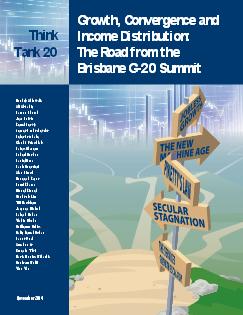Daniel Gros: “Quantitative Easing and Deflation in a Creditor Economy, στο Growth, Convergence and Income Distribution: The Road from the Brisbane G-20 Summit, pp. 87-91, Think Tank 20: November 2014.
On November 15-16th, world leaders gathered in Brisbane, Australia for the ninth G-20 summit, aimed at increasing world GDP and charting a pathway to sustainable, inclusive growth and resilience through both short and medium-term actions. Experts from think tanks around the world were commissioned by the Brookings Institution to address in a comprehensive report interrelated debates about growth, convergence and income distribution, three key elements that are likely to shape policy debates beyond the Brisbane summit.
Individual chapters provide insights from each G-20 member, as well as regional perspectives from Africa, Asia, Latin America and the Middle East. CEPS Director Daniel Gros was invited to contribute this chapter on the German economy, entitled “Quantitative Easing and Deflation in a Creditor Economy”.
Daniel Gros: Quantitative Easing and Deflation in a Creditor Economy
The world seems to be divided now between happy debtors and unhappy creditors. During the acute phase of the financial crisis it proved to be dangerous to be a debtor as risk aversion rose suddenly, and many debtors experienced difficulties in servicing their debt or simply rolling it over. During that time Germany appeared to be in a strong position as its economy proved resilient to the financial crisis. However, the world has moved on. Risk aversion has fallen again and the world is awash with liquidity and excess savings desperately looking for some return in an environment characterised by zero interest rates and an absence of inflationary pressures. In particular, the Anglo-Saxon debtor nations such as the U.K. and the U.S., which both have sizeable external deficits, are growing more quickly than creditor countries like Germany or, for that matter, the rest of the euro area in general.
Relevant posts:
- Gros, D. (2014) “Fighting Deflation: Would QE work in the euro area?“, Economic Policy, CEPS Commentaries, 09 October.
- Janssen, R. (2014) “Quantitative Easing Or Business Easing In Europe?“, Social Europe Journal, 08 September.
- Varoufakis, Y. (2014) “How should the ECB enact Quantitative Easing? A proposal“, Thoughts for the post-2008 World Blog, 19 May.




